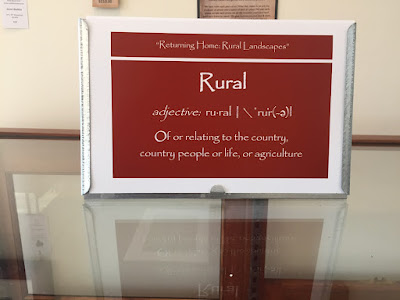I know it won’t be easy, but I’m determined to put more energy every day into accomplishing something good than I do into bitching about what’s wrong with people. (Complaints about weather, bugs, etc. come under a different category.) With that in mind, today I call your attention to a recent article published in the Daily Yonder: The Power of Place: Educator Helps Literature Teachers Connect Students to Their Rural Roots.
Parton, Ph.D., spoke to the students about her project, Literacy In Place, which promotes expanding literature curriculums to include works that speak directly to young rural students in middle school and high school classrooms.
 |
| Rural
Photo by J. Harrington
|
We are losing more and more of our rural population and I don't believe that's good for the country. In part, my New England upbringing accounts for my concern. Town meetings are a fundamental form of democracy. In part, I am vehemently opposed to industrial agriculture and Confined Animal Feeding Operations. Providing sustainably raised and grown food requires more people in farm country. If kids are ashamed of where they come from, they’re less likely to want to live there when they grow up.
We need urban and rural. We need country and city. That doesn’t have to mean that rural is dumber or that urban is slicker. I find that, while I concur with much of Parton’s thinking, I can’t agree with this:
“I realized that rural culture is a culture and that it’s different,” Parton said.
 |
| Place
Photo by J. Harrington
|
Based on my experience, education and reading, there is more than one rural culture. I’m more and more interested in exploring the concept of bioregionalism, which incorporates urban, rural, working lands and sometimes wilderness or oceans, and various cultures and subcultures in a bioregion.
With the exception about cultural pluralism stated above, I heartily agree with Parton’s principles:
Parton said that she based Literacy in Place on three principles:
- Rural stories are worth telling.
- Rural stories are worth reading and worthy of study.
- And rural cultures (imperfect as they may be) are worth sustaining.
I was surprised to see her listings didn’t appear to include any of Wendell Berry’s fiction. He’s fundamental to contemporary rural culture as far as I’m concerned.
Do not be ashamed
by Wendell Berry
You will be walking some night
in the comfortable dark of your yard
and suddenly a great light will shine
round about you, and behind you
will be a wall you never saw before.
It will be clear to you suddenly
that you were about to escape,
and that you are guilty: you misread
the complex instructions, you are not
a member, you lost your card
or never had one. And you will know
that they have been there all along,
their eyes on your letters and books,
their hands in your pockets,
their ears wired to your bed.
Though you have done nothing shameful,
they will want you to be ashamed.
They will want you to kneel and weep
and say you should have been like them.
And once you say you are ashamed,
reading the page they hold out to you,
then such light as you have made
in your history will leave you.
They will no longer need to pursue you.
You will pursue them, begging forgiveness.
They will not forgive you.
There is no power against them.
It is only candor that is aloof from them,
only an inward clarity, unashamed,
that they cannot reach. Be ready.
When their light has picked you out
and their questions are asked, say to them:
"I am not ashamed." A sure horizon
will come around you. The heron will begin
his evening flight from the hilltop.
********************************************
Thanks for visiting. Come again when you can.
Please be kind to each other while you can.
No comments:
Post a Comment